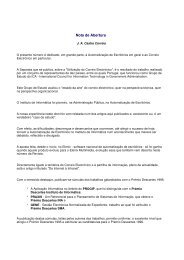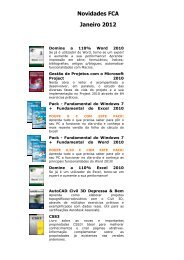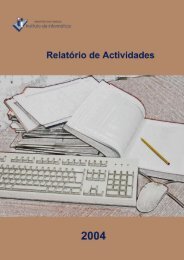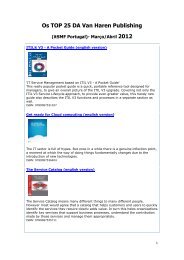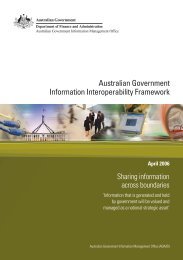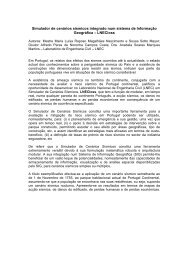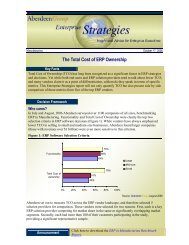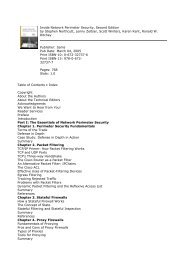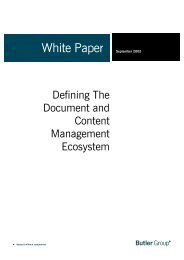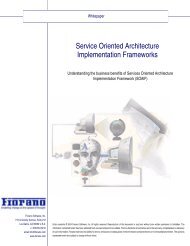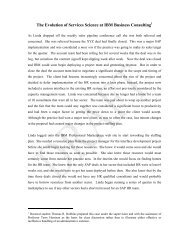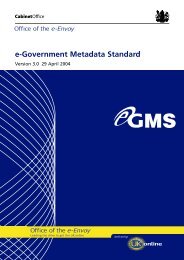OECD Peer Review of E-Government in Denmark - ePractice.eu
OECD Peer Review of E-Government in Denmark - ePractice.eu
OECD Peer Review of E-Government in Denmark - ePractice.eu
You also want an ePaper? Increase the reach of your titles
YUMPU automatically turns print PDFs into web optimized ePapers that Google loves.
In addition to support for the Jo<strong>in</strong>t Board, there was also strong support for the way the Digital<br />
Task Force and the IT-Policy Centre work together to br<strong>in</strong>g a balance <strong>of</strong> public management and<br />
technology perspectives to bear on the e-government programme. It was observed, however, that the<br />
relationship between the two organisations has not always been as collegial and complementary as it is<br />
today; difficulties <strong>in</strong> alignment and co-ord<strong>in</strong>ation have been a problem <strong>in</strong> the past. However, efforts to<br />
correct this situation, <strong>in</strong>clud<strong>in</strong>g clarification <strong>of</strong> their roles and responsibilities, have evidently been<br />
successful, with the two organisations now be<strong>in</strong>g widely seen to form a strong partnership at the centre<br />
<strong>of</strong> the e-government programme.<br />
The Digital Task Force and the IT-Policy Centre are seen as effective leaders, facilitators and<br />
co-ord<strong>in</strong>ators <strong>of</strong> efforts to achieve e-government. The Digital Task Force has been successful as a<br />
catalyst to br<strong>in</strong>g <strong>in</strong>terested parties together to solve problems <strong>of</strong> e-government co-ord<strong>in</strong>ation and<br />
co-operation across levels <strong>of</strong> government. It is an unusual organisation for Danish government,<br />
draw<strong>in</strong>g the majority <strong>of</strong> its staff as secondees from other State and local government organisations.<br />
These <strong>in</strong>dividuals br<strong>in</strong>g essential qualities <strong>of</strong> enthusiasm and understand<strong>in</strong>g <strong>of</strong> the potential <strong>of</strong> ICT to<br />
the work <strong>of</strong> the Task Force. Employment with the Task Force is regarded as recognition <strong>of</strong> prior good<br />
performance and potential, which helps attract top-quality candidates for Task Force positions.<br />
With the revision <strong>of</strong> the e-government strategy <strong>in</strong> 2004, the mandate <strong>of</strong> the Task Force was<br />
renewed until 2006, at which po<strong>in</strong>t it currently expects to be dismantled. This expectation is used by<br />
the Task Force to create <strong>in</strong>ternal drive towards the achievement <strong>of</strong> the <strong>Government</strong>’s goals, and to<br />
reta<strong>in</strong> clarity about the fact that e-government is regarded as an enabler <strong>of</strong> good government <strong>in</strong><br />
<strong>Denmark</strong> rather than be<strong>in</strong>g an ongo<strong>in</strong>g end <strong>in</strong> itself.<br />
In l<strong>in</strong>e with this time-bound mission, the Task Force has limited its staff numbers <strong>in</strong> order to<br />
rema<strong>in</strong> focused, and has relied on use <strong>of</strong> seconded staff or staff recruited from the private sector to<br />
build up e-government expertise across government. Task Force staff return to their own organisations<br />
after work<strong>in</strong>g on e-government for, on average, 18 months, help<strong>in</strong>g spread this expertise. The Task<br />
Force is perceived to be an energetic organisation whose broad-based composition enables it to<br />
understand e-government from a wide range <strong>of</strong> stakeholder perspectives. However, some <strong>in</strong>terviewees<br />
expressed concern that Task Force staff members are relatively young and <strong>in</strong>experienced <strong>in</strong> work<strong>in</strong>g at<br />
the top level <strong>of</strong> government. Regardless, there is a widespread view that either the Digital Task Force<br />
will still be required after its mandate expires <strong>in</strong> 2006, or that it will need to be replaced by some other<br />
means <strong>of</strong> provid<strong>in</strong>g leadership and co-ord<strong>in</strong>ation for e-government.<br />
The role and expertise <strong>of</strong> the Task Force is complemented by the IT-Policy Centre <strong>in</strong> the MVTU,<br />
which is seen as play<strong>in</strong>g a very important role <strong>in</strong> the development <strong>of</strong> many <strong>of</strong> the enablers <strong>of</strong><br />
e-government (e.g. digital signatures and the enterprise architecture). Under the revised e-government<br />
strategy its work is seen as be<strong>in</strong>g more supportive <strong>of</strong> government organisations, with greater emphasis<br />
on develop<strong>in</strong>g concrete solutions to problems they face, while the Digital Task Force reta<strong>in</strong>s<br />
responsibilities <strong>in</strong> strategy development and oversight <strong>of</strong> all-<strong>of</strong>-government projects.<br />
The overall strength <strong>of</strong> these top-level arrangements for leadership and co-ord<strong>in</strong>ation <strong>of</strong><br />
e-government is <strong>in</strong>dicated by the responses to the <strong>OECD</strong> survey question that asked organisations<br />
about the strength <strong>of</strong> potential challenges to their implementation <strong>of</strong> e-government. Duplication <strong>of</strong><br />
actors and unclear <strong>in</strong>stitutional responsibilities at this level <strong>of</strong> e-government can <strong>of</strong>ten be significant<br />
problems <strong>in</strong> <strong>OECD</strong> countries. In <strong>Denmark</strong>’s case, however, when presented with a wide range <strong>of</strong><br />
potential challenges to their implementation <strong>of</strong> e-government, less than 1% <strong>of</strong> survey respondents<br />
identified “duplication” as be<strong>in</strong>g “very important” – the lowest response for any challenge (see Figure<br />
6.1). Also, 65% <strong>of</strong> respondents did not regard this issue as a challenge at all. However, nearly 13% <strong>of</strong><br />
respondents reported that duplication was an “important” challenge, and almost 21% said it was<br />
74



